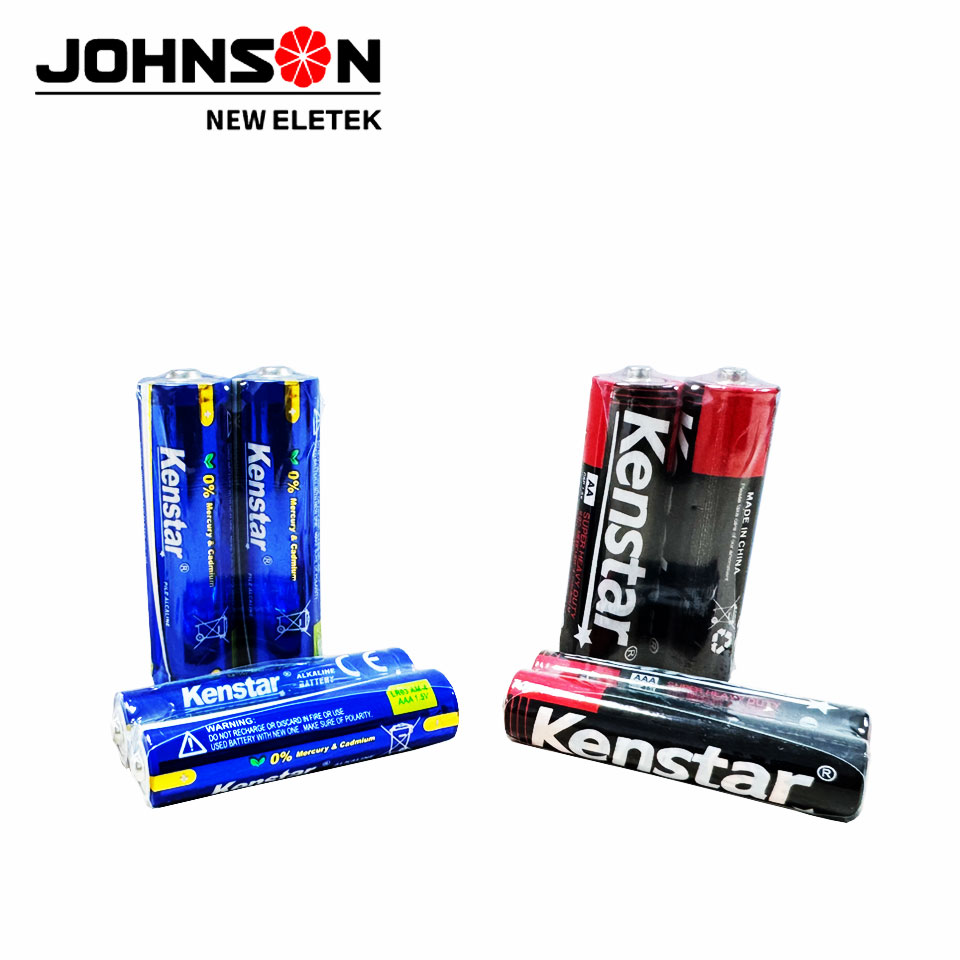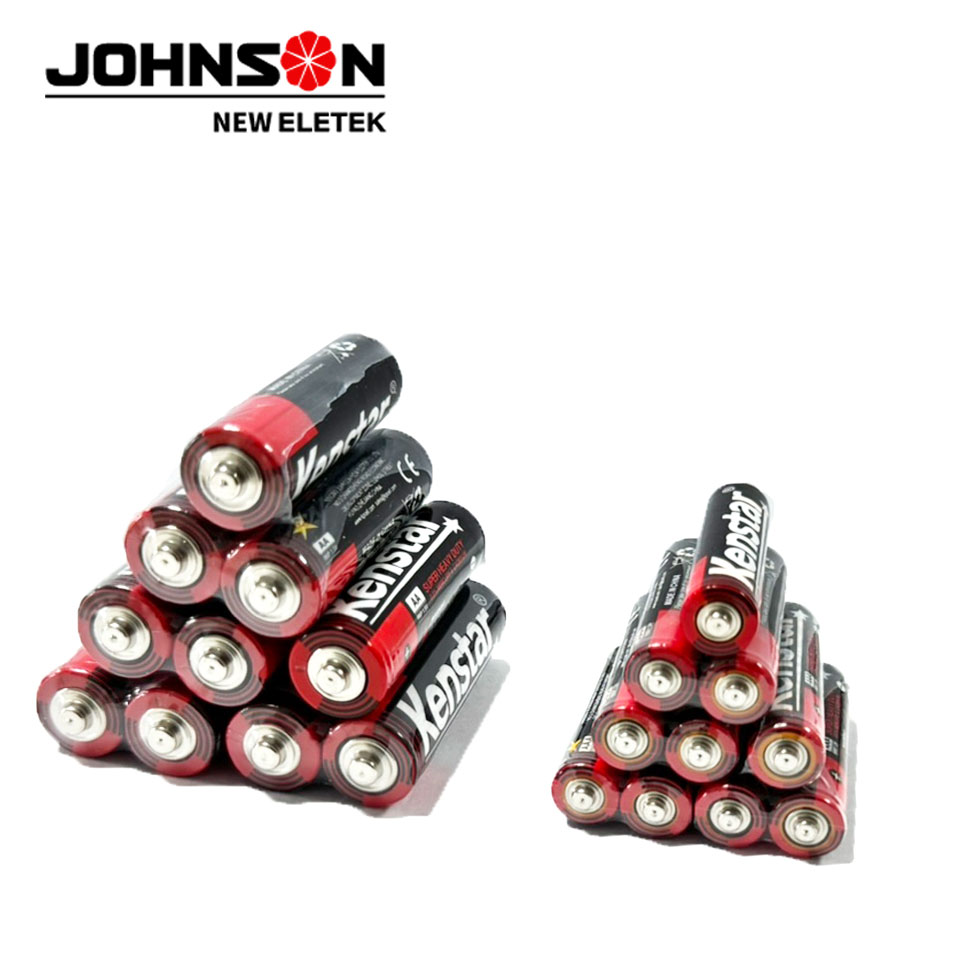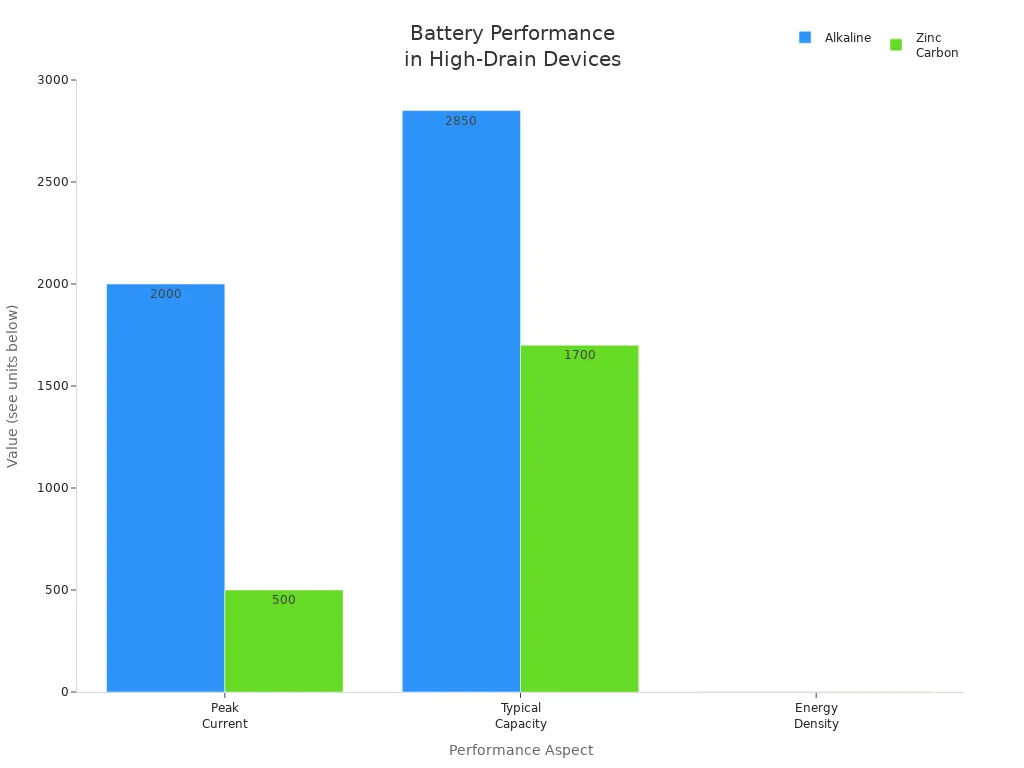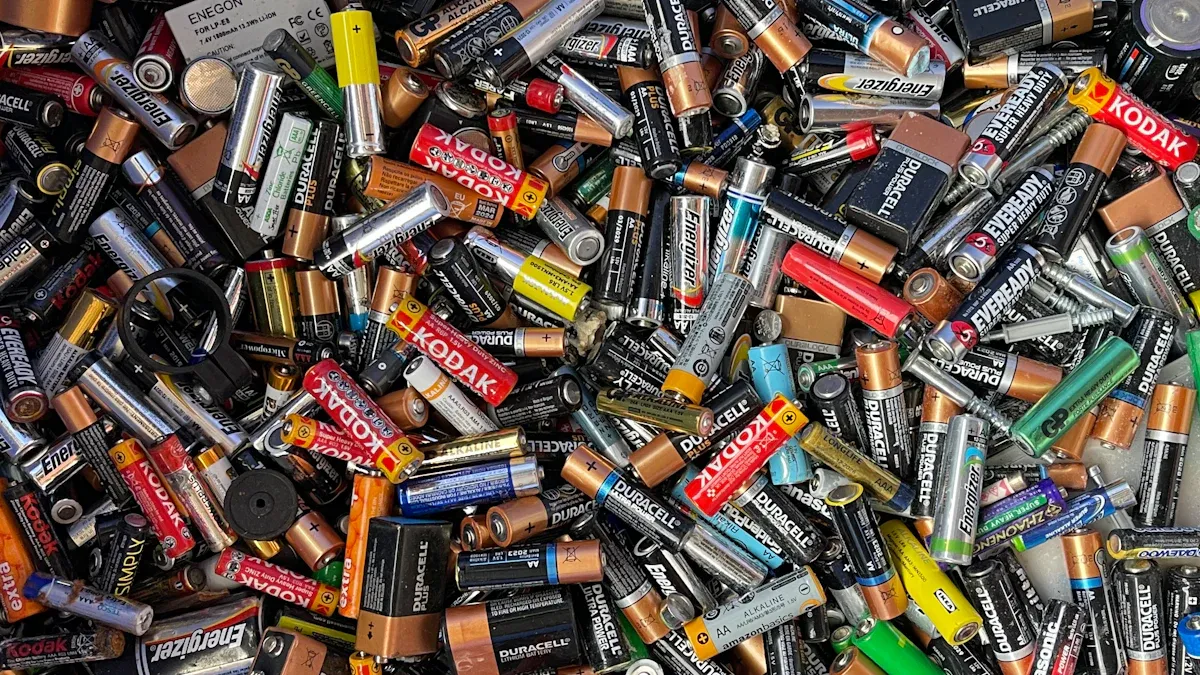
When I choose a Zinc Carbon Battery for my remote or flashlight, I notice its popularity in the global market. Market research from 2023 shows it accounts for over half of the alkaline battery segment’s revenue. I often see these batteries in low-cost devices like remotes, toys, and radios.
Key point: Zinc Carbon Battery remains a practical choice for many everyday electronics.
Key Takeaways
- Alkaline batteries last longer and deliver stronger, more reliable power, making them ideal for high-drain devices like flashlights and gaming controllers.
- Zinc carbon batteries are cost-effective and work well in low-drain devices such as remote controls and clocks but have shorter lifespan and higher leakage risk.
- Choosing the right battery type based on your device’s power needs improves performance, safety, and overall value.
Zinc Carbon Battery vs. Alkaline: Key Differences

Battery Chemistry Explained
When I compare battery types, I notice that the internal chemistry sets them apart. Zinc Carbon Battery uses a carbon rod as the positive electrode and a zinc casing as the negative terminal. The electrolyte inside is usually ammonium chloride or zinc chloride. Alkaline batteries, on the other hand, rely on potassium hydroxide as the electrolyte. This difference in chemistry means alkaline batteries have higher energy density and lower internal resistance. I see that alkaline batteries also tend to be more environmentally friendly because they contain minimal mercury.
Key Point: The chemical makeup of each battery type directly affects its performance and environmental impact.
Energy Density and Power Output
I often check the energy density when choosing batteries for my devices. Alkaline batteries store more energy and deliver better power output, especially in high-drain electronics. Zinc Carbon Battery works best in low-drain applications. Here’s a quick comparison:
| Battery Type | Typical Energy Density (Wh/kg) |
|---|---|
| Zinc-Carbon | 55 to 75 |
| Alkaline | 45 to 120 |
Alkaline batteries last longer and perform better in demanding situations.
Key Point: Higher energy density in alkaline batteries means longer usage and stronger power for modern devices.
Voltage Stability Over Time
I notice that voltage stability plays a big role in device performance. Alkaline batteries maintain steady voltage for most of their lifespan, keeping devices running at full power until nearly empty. Zinc carbon batteries lose voltage faster, which can cause devices to slow down or stop before the battery is fully drained. Alkaline batteries also recover quickly after heavy use, while zinc carbon batteries take much longer.
- Alkaline batteries support high peak currents and cycle efficiency.
- Zinc carbon batteries have lower peak current and cycle efficiency.
Key Point: Alkaline batteries provide more reliable voltage, making them a better choice for devices that need consistent power.
Zinc Carbon Battery Performance in Devices
High-Drain vs. Low-Drain Device Results
When I test batteries in different devices, I see a clear difference in how they perform. High-drain electronics, like digital cameras and gaming controllers, demand a lot of power quickly. Low-drain devices, such as remote controls and clocks, use energy slowly over time. I notice that alkaline batteries excel in high-drain applications because they deliver higher peak current and maintain steady voltage. Zinc Carbon Battery works best in low-drain devices, where energy demands stay low and consistent.
Here’s a comparison table that highlights these differences:
| Performance Aspect | Alkaline Batteries | Carbon (Zinc Carbon) Batteries |
|---|---|---|
| Peak Current | Up to 2000 mA | Around 500 mA |
| Cycle Efficiency | Higher, maintains steady voltage longer | Lower, voltage drops quickly |
| Recovery Time | Approximately 2 hours | Over 24 hours, may not fully recover |
| Energy Density | High, stores more energy | Lower, stores less energy |
| Typical Capacity (mAh) | 1,700 to 2,850 mAh | 400 to 1,700 mAh |
| Suitable Devices | High-drain electronics | Low-drain devices |
| Voltage per Cell | 1.5 volts | 1.5 volts |

Summary Point: Alkaline batteries outperform zinc carbon in high-drain devices, while Zinc Carbon Battery remains reliable for low-drain electronics.
Real-World Example: Flashlight Test
I often use flashlights to compare battery performance because they require steady, high power. When I install Zinc Carbon Battery in a flashlight, I notice the beam dims quickly and the runtime is much shorter. Alkaline batteries keep the beam bright for a longer period and maintain consistent voltage under load. Zinc carbon batteries have about one-third the energy capacity of alkaline batteries, and their voltage drops rapidly during use. I also observe that zinc carbon batteries are lighter and sometimes perform better in cold temperatures, but they have a higher risk of leakage, which can damage the flashlight.
Here’s a table summarizing the flashlight test results:
| Feature | Zinc Carbon Batteries | Alkaline Batteries |
|---|---|---|
| Voltage at Start | ~1.5 V | ~1.5 V |
| Voltage Under Load | Drops quickly to ~1.1 V and then falls rapidly | Maintains between ~1.5 V and 1.0 V |
| Capacity (mAh) | 500-1000 mAh | 2400-3000 mAh |
| Flashlight Performance | Beam dims quickly; shorter runtime due to rapid voltage drop | Brighter beam maintained longer; longer runtime |
| Suitable Devices | Low-drain devices (clocks, remotes) | High-drain devices (flashlights, toys, cameras) |
Summary Point: For flashlights, alkaline batteries deliver brighter light and longer runtime, while Zinc Carbon Battery is better suited for low-drain use.
Impact on Toys, Remotes, and Clocks
When I power toys, remote controls, and clocks, I see that Zinc Carbon Battery provides dependable service for low-power needs. These batteries last about 18 months in devices like clocks and remotes. Alkaline batteries, with higher energy density and capacity, extend operational time to around 3 years. For toys that require bursts of energy or longer playtime, alkaline batteries offer up to seven times the power and perform better in cold conditions. I also notice that alkaline batteries have a longer shelf life and lower risk of leakage, which helps protect devices from damage.
Here’s a quick comparison:
| Feature | Zinc Carbon Batteries | Alkaline Batteries |
|---|---|---|
| Typical Use | Low-power devices (toys, remote controls, clocks) | Long-term use in similar devices |
| Energy Density | Lower | Higher |
| Lifespan | Shorter (approx. 18 months) | Longer (approx. 3 years) |
| Risk of Leakage | Higher (due to zinc degradation) | Lower |
| Performance in Cold Temps | Poorer | Better |
| Shelf Life | Shorter | Longer |
| Cost | Cheaper | More expensive |
Summary Point: Zinc Carbon Battery is cost-effective for short-term, low-drain use, but alkaline batteries provide longer life and better reliability for toys, remotes, and clocks.
Battery Life: Zinc Carbon Battery vs. Alkaline
How Long Each Type Lasts
When I compare battery life, I always look at standardized test results. These tests give me a clear picture of how long each battery type lasts in typical conditions. I see that Zinc Carbon Battery usually powers devices for about 18 months. Alkaline batteries, on the other hand, last much longer—up to 3 years in similar devices. This difference matters when I want to avoid frequent battery changes.
| Battery Type | Average Lifespan in Standardized Tests |
|---|---|
| Zinc Carbon (Carbon-Zinc) | About 18 months |
| Alkaline | About 3 years |
Note: Alkaline batteries offer a longer lifespan, which means fewer replacements and less maintenance for everyday electronics.
Example: Wireless Mouse Battery Life
I often use wireless mice for work and study. Battery life in these devices can affect my productivity. When I install a Zinc Carbon Battery, I notice the mouse needs a new battery sooner. Alkaline batteries keep my mouse running much longer because they have higher energy capacity and better discharge characteristics.
- Zinc carbon batteries work best in low-power devices like clocks and wireless mice.
- Alkaline batteries are ideal for devices with higher power needs.
- In wireless mice, alkaline batteries provide longer battery life due to their greater capacity.
| Aspect | Zinc Carbon Battery (Carbon-Zinc) | Alkaline Battery |
|---|---|---|
| Energy Capacity | Lower capacity and energy density | Higher capacity and energy density (4-5 times greater) |
| Discharge Characteristics | Not suitable for high-rate discharge | Suitable for high-rate discharge |
| Typical Applications | Low-power devices (e.g., wireless mice, clocks) | Higher current devices (e.g., pagers, PDAs) |
| Battery Life in Wireless Mouse | Shorter battery life due to lower capacity | Longer battery life due to higher capacity |
Key summary: Alkaline batteries deliver longer, more reliable service in wireless mice and other devices that require steady power.
Leakage Risk and Device Safety with Zinc Carbon Battery
Why Leakage Happens More Often
When I examine battery safety, I notice that leakage occurs more frequently in zinc carbon batteries than in alkaline types. This happens because the zinc can, which serves as both the shell and the negative electrode, gradually thins as the battery discharges. Over time, the weakened zinc allows the electrolyte to escape. I have learned that several factors contribute to leakage:
- Poor sealing or low-quality sealing glue
- Impurities in manganese dioxide or zinc
- Low-density carbon rods
- Manufacturing defects or raw material flaws
- Storage in hot or humid environments
- Mixing old and new batteries in one device
Zinc carbon batteries often leak after being fully used or after several years in storage. The byproducts, such as zinc chloride and ammonium chloride, are corrosive and can damage devices.
Note: Alkaline batteries have improved seals and additives that reduce gas buildup, making them less likely to leak than zinc carbon batteries.
Potential for Device Damage
I have seen firsthand how battery leakage can harm electronics. The corrosive substances released from a leaking battery attack metal contacts and battery terminals. Over time, this corrosion can spread to the surrounding circuitry, causing devices to malfunction or stop working altogether. The extent of the damage depends on how long the leaked chemicals remain inside the device. Sometimes, early cleaning can help, but often the damage is permanent.
Common issues include:
- Corroded battery terminals
- Damaged battery contacts
- Failure of electronic circuits
- Ruined plastic parts
Real-World Example: Corroded Remote Control
I once opened an old remote control and found white, powdery residue around the battery compartment. The Zinc Carbon Battery inside had leaked, corroding the metal contacts and damaging the circuit board. Many users have reported similar experiences, losing remotes and joysticks due to battery leaks. Even quality brand-name batteries can leak if left unused for years. This kind of damage often requires replacing the entire device.
Key summary: Zinc carbon batteries have a higher risk of leakage, which can cause serious and sometimes irreversible damage to electronic devices.
Cost Comparison: Zinc Carbon Battery and Alkaline
Upfront Price vs. Long-Term Value
When I shop for batteries, I notice that zinc carbon options often cost less than alkaline batteries. The lower upfront price attracts many buyers, especially for simple devices. I see that alkaline batteries usually cost more at the register, but they deliver longer service life and higher energy output. To compare the value, I look at how often I need to replace each type.
| Battery Type | Typical Upfront Cost | Average Lifespan | Shelf Life |
|---|---|---|---|
| Zinc Carbon | Low | Shorter | ~2 years |
| Alkaline | Moderate | Longer | 5-7 years |
Tip: I always consider both the initial price and how long the battery lasts before making a decision.
When Cheaper Isn’t Better
I have learned that a lower price does not always mean better value. In high-drain devices or situations where I use electronics continuously, zinc carbon batteries drain quickly. I end up buying replacements more often, which increases my total spending over time. I also notice that zinc carbon batteries have a shorter shelf life, so I need to repurchase them more frequently. Here are some scenarios where the lower upfront cost leads to higher long-term expenses:
- Devices with high energy consumption, such as toys or flashlights, require frequent battery changes.
- Continuous use in items like wireless mice or game controllers causes zinc carbon batteries to run out faster.
- Shorter shelf life means I replace batteries more often, even if I store them for emergencies.
- Lower energy efficiency results in higher cumulative costs for households with many battery-powered devices.
Note: I always calculate the total cost over the expected lifespan of the device, not just the price on the shelf.
Key summary: Choosing the cheapest battery may seem smart, but frequent replacements and shorter shelf life often make alkaline batteries the better long-term investment.
Which Devices Are Best for Zinc Carbon Battery or Alkaline?
Quick Reference Table: Device Suitability
When I select batteries for my devices, I always check which type matches the device’s power needs. I rely on a quick reference table to make the right choice:
| Device Type | Recommended Battery Type | Reason |
|---|---|---|
| Remote controls | Zinc-carbon or Alkaline | Low power draw, both types work well |
| Wall clocks | Zinc-carbon or Alkaline | Minimal energy use, long-lasting |
| Small radios | Zinc-carbon or Alkaline | Steady, low power needed |
| Flashlights | Alkaline | Brighter, longer-lasting performance |
| Digital cameras | Alkaline | High-drain, needs steady, strong power |
| Gaming controllers | Alkaline | Frequent, high energy bursts |
| Wireless mice/keyboards | Alkaline | Reliable, long-term use |
| Basic toys | Zinc-carbon or Alkaline | Depends on power demand |
| Smoke detectors | Alkaline | Safety-critical, requires long shelf life |
I find that zinc-carbon batteries work best in low-drain devices like clocks, remotes, and simple toys. For high-drain electronics, I always choose alkaline batteries for better performance and safety.
Tips for Choosing the Right Battery
I follow a few best practices to ensure my devices run smoothly:
- Check the device’s power needs. High-drain devices, such as cameras or gaming controllers, need batteries with higher capacity and steady voltage. I use alkaline batteries for these.
- Consider how often I use the device. For items I use daily or for long periods, alkaline batteries last longer and reduce the hassle of frequent replacements.
- Think about shelf life. I store alkaline batteries for emergencies because they keep their charge for years. For devices I use occasionally, zinc-carbon batteries offer a cost-effective solution.
- Never mix battery types. I avoid mixing alkaline and zinc-carbon batteries in the same device to prevent leakage and damage.
- Prioritize safety and environment. I look for mercury-free and eco-friendly options whenever possible.
Key summary: I match battery type to device needs for the best performance, safety, and value.
Disposal and Environmental Impact of Zinc Carbon Battery

How to Dispose of Each Type
When I dispose of batteries, I always check local guidelines. The EPA recommends placing household alkaline and zinc carbon batteries in regular trash in most communities. However, I prefer recycling because it protects the environment and conserves valuable materials. I often take small quantities to retailers like Ace Hardware or Home Depot, which accept batteries for recycling. Businesses with larger volumes should contact specialized recycling services for proper handling. Recycling involves separating batteries, crushing them, and recovering metals such as steel, zinc, and manganese. This process prevents harmful chemicals from entering landfills and water sources.
- Older alkaline batteries manufactured before 1996 may contain mercury and require hazardous waste disposal.
- Newer alkaline and zinc carbon batteries are generally safe for household trash, but recycling is the best option.
- Proper disposal reduces environmental harm from battery components.
Tip: I always consult local solid waste authorities for the safest disposal methods.
Environmental Considerations
I recognize that improper battery disposal can harm the environment. Both alkaline and zinc carbon batteries may leach metals and chemicals into soil and water if discarded in landfills. Recycling helps prevent contamination and conserves resources by reclaiming zinc, steel, and manganese. This practice supports a circular economy and reduces the need for raw material extraction. Alkaline batteries are usually classified as non-hazardous, making disposal easier, but recycling remains the most responsible choice. I notice that zinc carbon batteries may leak more frequently, increasing environmental risks if mishandled or stored improperly.
Recycling batteries not only protects the environment but also supports economic growth through job creation and sustainability initiatives.
Key summary: Recycling batteries is the most effective way to minimize environmental impact and promote responsible resource management.
When I choose batteries, I always match them to my device’s needs. Alkaline batteries last longer, perform better in high-drain electronics, and have a lower risk of leakage. For low-drain devices, cost-effective options work well. I recommend alkaline for most modern electronics.
Key summary: Select batteries based on device requirements for best results.
FAQ
Can I mix zinc carbon and alkaline batteries in the same device?
I never mix battery types in one device. Mixing can cause leakage and reduce performance.
Key summary: Always use the same battery type for best results.
Why do zinc carbon batteries cost less than alkaline batteries?
I notice zinc carbon batteries use simpler materials and manufacturing processes.
- Lower production cost
- Shorter lifespan
Key summary: Zinc carbon batteries offer a budget-friendly option for low-drain devices.
How do I store batteries to prevent leakage?
I keep batteries in a cool, dry place away from direct sunlight.
- Avoid extreme temperatures
- Store in original packaging
Key summary: Proper storage helps prevent leakage and extends battery life.
Post time: Aug-21-2025




